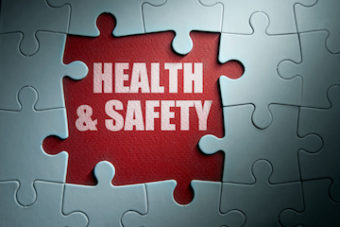Whether you work for a business or you own one, it’s more than likely that you’ve groaned at the mention of ‘health and safety’ at least once in the past.
Health and safety isn’t the most riveting topic in the world, but, newsflash: it’s incredibly important if you’re wanting to abide by the law. And this is where the Health & Safety at Work Act 1974 comes in.
You can download the full legislation here for free, but in this blog we’re going to give you a simple overview of what the Act is, why it matters and the different responsibilities that come with it.
What is the Health & Safety at Work Act 1974?
Often referred to as the HASAWA or HSW, The Health and Safety at Work Act 1974 provides in-depth information on the responsibilities people have regarding health and safety in the workplace. The bottom line of the legislation is that it’s mainly down to the employer to look after the health, safety and welfare of every single employee.
It doesn’t stop here, though: an employer also has the duty of protecting that of any temporary/casual workers, visitors, clients and pretty much anyone who is on the premises.
There is also a level of responsibility that falls on employees to maintain their own health and safety and employers must provide training and adequate instruction so that staff are fully equipped to do this.
Now let’s look at why you should care about health and safety in the first place.
Learn why employee health and wellbeing is key to business success
Why is it important that you comply with HSW?
1. Every workplace has hazards
Even if you’re office based and aren’t faced with dealing with heavy machinery or toxic substances, you’ll still be exposed to hazards every day. Think electricity, eye strain, fire risks, back problems and even stress and mental health risks.
2. Accidents are expensive
According to a report from Health and Safety Executive, the cost of injuries and ill health from current working conditions was estimated at a staggering £15 billion in 2017/18. And this is hardly surprising with 30.7 million working days lost solely because of these occurrences – a frighteningly loss for productivity.
3. It makes business sense
As Richard Branson famously says, ‘take care of your employees and they’ll take care of your business’. And it really is that simple.
In the same way that you should be prioritising building a strong company culture, if you’re seen to be putting your employees’ health and safety first too, you’re more likely to have trusting, loyal employees who feel valued and are genuinely invested in you and the business. What could be better for business success?
Employers’ duty of care
As part of the Health and Safety at Work Act 1974, employers have certain responsibilities that they need to stick to. As an overview, employers are required to:
- Do whatever is reasonably practical to make sure the health, safety and welfare of employees and others is protected
- Provide adequate training to ensure employees fully understand health and safety procedures
- Provide a safe, maintained working environment for employees
- Assess risks in the workplace and put things in place to prevent them
- Provide employees with any equipment/protective clothing so that risks are minimised
- Implement an official health and safety policy if they employ 5 or more people.
What employees need to do
As we mentioned earlier on, employees also have a degree of responsibility when it comes to the Health and Safety at work Act. Employees have a common-law duty of care, so it’s just as important that they cooperate when it comes to maintaining Health and Safety in the workplace. Their responsibilities include:
- Taking reasonable care for the health and safety of themselves and others too
- Not obstructing anything that has been put in place to maintain health and safety in the workplace
- Cooperate with the employer so that everyone can meet their legal requirements
- Tell someone if they feel the precautions put in place are not enough to prevent harm

